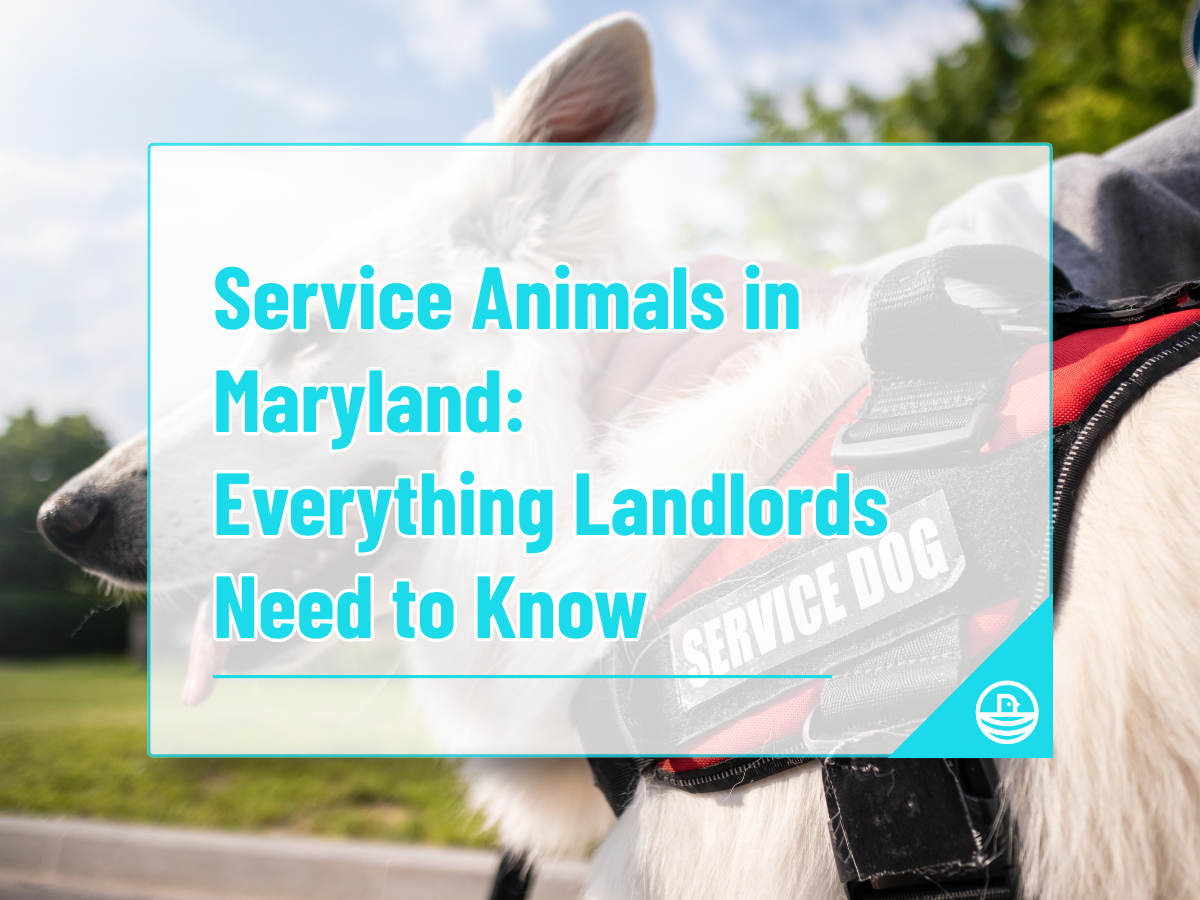Service Animals in Maryland: Everything Landlords Need to Know
Baltimore has one of the highest disability rates in Maryland, with 15.8% of residents living with one. This is well above the national average of 13.5%. Combine that with the fact that over half of the city’s homes are renter-occupied, and it’s clear that at some point, landlords are going to encounter requests for service animals in Baltimore.
Handling these requests the wrong way, even if you didn’t know any better, can put you at risk of fair housing violations and discrimination complaints. That’s why it’s important to understand the protections service animal law gives to tenants, and the rights it gives to landlords. In this guide, we’ll break down the definition of a service animal, the questions you can ask, and the documentation you can request. By the end, you’ll be more prepared to protect your property while also ensuring you’re treating tenants fairly and respectfully in line with service animal law.

What Qualifies as a Service Animal in Baltimore?
For people living with physical or mental disabilities, a service animal can be life-changing. These highly trained animals help their handlers complete everyday tasks, avoid danger, and live independently.
In Maryland, a service animal is defined as a dog (or in some cases, a miniature horse) that has been individually trained to perform a specific task for someone with a disability. This definition comes from the Americans with Disabilities Act (ADA) and the Fair Housing Act (FHA), but Maryland also enforces it through their state code, Human Services § 7-705, which outlines additional protections for both handlers and trainers.
To qualify as a service animal, the task must be related to the person’s disability. Some of the jobs service animals in Baltimore might perform include:
- Guiding someone who is blind or has limited vision
- Retrieving dropped items or medication
- Assisting with balance or mobility issues
- Getting help for someone having a seizure
- Alerting someone who is deaf to sounds like alarms or knocks
- Providing deep pressure therapy (DPT) during anxiety attacks
Under state law, service animals in Baltimore do not need to wear any special tags, collars, or vests to be protected.
Are Service Animals, Pets, and Emotional Support Animals All Protected?
One of the reasons service animal law can be confusing is because people use the term service animal interchangeably with emotional support animals (ESAs) and pets. As a landlord, it’s important to know that each of these animals falls into its own unique category, with different protections and rules.
A service animal is a dog (or miniature horse) that does a specific job for someone with a disability. These animals are protected by the ADA, FHA, and Maryland state law. That means:
- You cannot charge pet rent, pet deposits, or additional fees for tenants who own one
- You can’t deny the animal based on breed, size, or building rules
- You’re not allowed to ask for documentation, training certificates, or demonstrations of the task the animal does
- You must allow them to live in your rental property, even if you have a no-pet policy in place
- You can only ask the tenant two specific questions to determine its validity (and only if the tenant’s disability isn’t clear)
Emotional support animals (ESAs) are not task-trained, but they do provide comfort and therapeutic support to people with diagnosed mental or emotional disabilities like anxiety, autism, or PTSD. While they’re not covered by the ADA, they do have protections under the Fair Housing Act (FHA). When it comes to ESAs:
- They can be any species
- Tenants must provide a letter from a licensed healthcare provider stating their need for the animal
- Unlike service animals, ESAs don’t have public access rights outside of housing
- You cannot charge pet fees if their documentation is valid
Pets, in contrast to service animals and ESAs, are not protected under any federal or state housing laws. If the animal isn’t a trained service dog and the tenant doesn’t provide you with ESA documentation, it’s considered a pet. You’re within your rights to:
- Enforce breed, size, species, or weight restrictions
- Deny them altogether
- Limit the number of them in your unit
- Charge a pet deposit or monthly pet rent
If a tenant tells you that their animal helps them with anxiety or is part of their treatment plan, don’t assume it qualifies as a service animal. Often, that’s ESA language, and a sign that you need more information. Understanding these categories can help you avoid making legal mistakes and help tenants feel more comfortable and welcomed.
What You Can Ask Under Maryland’s Service Animal Law
If you’ve never gotten a service animal request before, then you may not know how to respond when a tenant comes to you with one. Service animal law is clear about what landlords in Maryland are allowed to ask, and just as clear about what you’re not. If the tenant’s need for the animal isn’t visible, you can ask them these two questions:
- Do you need the animal for a disability?
- What job has your animal been trained to do for you?
If the tenant’s answers are appropriate and their animal meets the legal definition of an assistance animal, you are obligated to allow it on the property. Not asking additional questions or requiring extra proof will keep you out of legal trouble and show the tenant that you respect their privacy and need for reasonable accommodation.
Required Documentation for Service Animals in Baltimore
While you are not allowed to ask for any type of documentation from service animal handlers, you can request it for ESAs, according to the FHA. In those cases, you can require a letter from a licensed healthcare provider confirming that:
- The tenant has a qualifying mental or emotional disability
- The animal provides support related to that condition
Similar to service animals, you aren’t allowed to ask for training certificates, medical records, or any additional paperwork besides what’s listed above for an ESA. Doing so could violate fair housing law.
It’s smart to have a process in place for handling conversations and requests related to service animals in Baltimore. You might consider:
- Creating a written accommodation request form for tenants to fill out (containing the two legal questions you’re allowed to ask)
- Listing a designated email address or point of contact (like a property manger)
- Having internal rules about how to communicate with tenants when dealing with service animal requests (emphasizing respect, transparency, and compliance with the law)
Having every tenant go through the same process ensures fairness, open lines of communication, and shows residents that you care about helping them find housing that meets their needs.
When and How to Add a Service Animal to the Lease
It’s a common misconception that service animals in Baltimore must be added to the lease before signing. While it’s helpful to know about a service animal upfront, sometimes tenants don’t disclose it right away, or their disability develops after they’re already moved in. Although many tenants will let you know about the animal as a courtesy, know that they’re not required to under service animal law.
As a landlord, you must accommodate valid requests for service animals in Baltimore at any point of the lease term. Once you’ve verified that they quality under service animal law, it’s a good idea to document it with a lease addendum that includes:
- A statement confirming the animal is a service animal and not a pet
- Clear expectations for behavior, including noise and cleanliness
- A reminder that the tenant is still responsible for any damages caused by the animal
- House rules that still apply (like leashing the animal in common areas)
Even though the tenant won’t have to pay a pet deposit, you can still charge them for damages and use the funds from their general security deposit to cover it, if needed. While these animals are afforded extra protections under service animal law, they’re also subject to many of the same rules any other tenant would be. Writing down these details gives both parties something to fall back on in case problems arise down the road.
Can a Landlord Deny a Service Animal?
In most situations, you’re required by law to allow service animals in Baltimore as long as the tenant qualifies. However, there are a few very limited exceptions where you may legally deny or remove a service animal from a rental unit.
Service animal law says that denial is justified in the following four cases:
- The animal would alter the nature of your housing services
- The animal causes significant property damage or has a history of doing so
- Accommodating the animal would create an excessive financial or administrative burden for you
- The animal poses a direct threat to the health or safety of other residents that can’t be reduced or eliminated through other means
Denials are rarely approved since the landlord must do everything in their power to try and accommodate the animal. This is known as making a good faith effort to provide a reasonable accommodation. Even if you had a bad experience with an animal of the same breed in the past or you feel uncomfortable with it, that’s not a good enough reason to deny it. You may even have concerns about allergies, but unless another resident’s documented medical needs interfere with the tenant's need, there’s no legal grounds for denial to stand on.
If you need to deny an animal for any reason, be sure to document any communication with the tenant and put all the details in writing. That way, if the tenant complains, you have records to legally protect yourself. Often, open communication with the tenant can go a long way in preventing misunderstandings or conflict. If you’re ever unsure how to handle a service animal request, consider working with a lawyer who understands service animal law or hire a property manager to take care of it for you.
Final Thoughts: Keeping Up with Service Animal Law in Maryland
Handling service animal requests the right way helps safeguard your rental property and creates a welcoming, inclusive community for your tenants. Since you’ll eventually come across one of these requests in Baltimore, it’s essential to stay up to date.
The Maryland Department of Disabilities regularly updates its website with new laws related to service animals in Baltimore. Taking the time to read these updates can make a big difference for your rental business, helping you prevent legal issues like discrimination complaints. Knowing what makes a service animal special, understanding what you’re allowed to ask and request, and recognizing what justifies a denial will keep things fair and respectful for both parties.
If keeping track of the legal changes sounds like too much to do alone, consider partnering with a property management company like Evernest. Our Baltimore team stays up-to-date with the latest laws and takes care of everything from paperwork to lease terms for you. Contact us today so that you can pass off the hard parts of property management and focus on expanding your rental portfolio instead.













